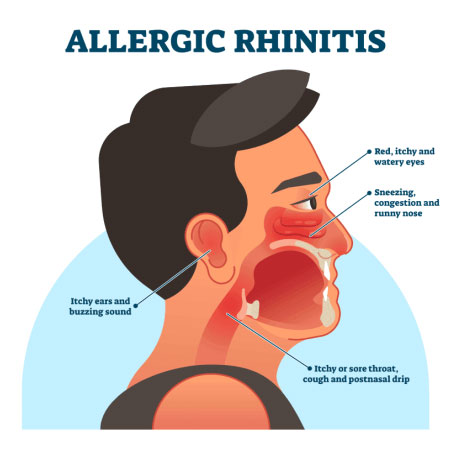
Dr. Amrita Khatri
M.D., B.H.M.S.Book Appointment
Allergic Rhinitis

Allergic rhinitis, often referred to as hay fever, is a common allergic condition that affects the nasal passages and is characterized by inflammation and irritation of the nasal lining in response to allergens. It can cause a variety of symptoms, primarily in the nose and eyes, when a person is exposed to substances they are allergic to.
Allergic rhinitis can significantly affect a person's quality of life, as it can interfere with sleep, daily activities, and overall well-being.

Symptoms of Allergic Rhinitis
- Sneezing: Frequent, uncontrollable sneezing, often in rapid succession.
- Runny Nose: Clear nasal discharge that may be persistent.
- Stuffy Nose: Nasal congestion, making it difficult to breathe through the nose.
- Itchy Nose, Throat, or Eyes: Persistent itching in the nasal passages, throat, or eyes.
- Watery Eyes: Excessive tearing and eye irritation.
- Postnasal Drip: A sensation of mucus draining down the back of the throat, which can lead to coughing or throat clearing.
- Coughing: A dry cough often caused by postnasal drip or irritation in the throat.
- Headache: Sinus pressure or headache, especially around the forehead and eyes.
- Fatigue: Feeling unusually tired or lethargic, often due to disrupted sleep or the body's response to allergens.
- Dark Circles Under the Eyes: Swelling and discoloration around the eyes, often referred to as "allergic shiners."
Causes of Allergic Rhinitis
- Pollen: Exposure to pollen from trees, grasses, and weeds, especially during specific seasons, leading to seasonal allergies or hay fever.
- Dust Mites: Tiny organisms found in household dust that can trigger allergic reactions year-round.
- Pet Dander: Proteins found in the skin flakes, saliva, and urine of animals such as cats, dogs, and rodents.
- Mold Spores: Airborne mold spores from damp or humid environments can trigger allergic rhinitis.
- Airborne Irritants: Exposure to pollutants, cigarette smoke, strong odors, or chemical fumes that can exacerbate symptoms.
- Cockroach Droppings: Allergens from cockroach droppings or body parts can trigger symptoms, especially in urban areas.
- Weather Changes: Cold air, humidity, or wind can worsen symptoms in some individuals.
- Genetics: A family history of allergies increases the likelihood of developing allergic rhinitis.
- Certain Foods: Some individuals may experience oral allergy syndrome, where certain fruits or vegetables cause symptoms similar to allergic rhinitis.
Types of allergic rhinitis:
- 1) Seasonal Allergic rhinitis: Symptoms usually appear in particular seasons when allergen levels are at their peak level.
- 2) Perennial allergic rhinitis: Symptoms are throughout the year due to exposure to indoor allergens like dust, mites and pet dander.
Diagnosis:
- Medical history and physical examination: Doctor reviews symptoms and conducts a physical examination to assess the nasal passages.
- Allergy testing: Skin prick tests, patch tests help to identify specific allergens.
- Blood test : Specific blood test to measure the amount of IgE antibodies in blood. IgE antibodies are produced inside the body in response to allergen, bacteria and viruses.
Complications:
- Nasal polyp: Abnormal and non cancerous growths may develop inside the nose and sinuses leading to difficulty in breathing.
- Sinusitis: Inflammation of sinus may occur due to exposure to allergens.
Treatment:
- Avoidance: Identifying and minimizing the exposure of specific allergen is the most important step for its treatment.
- Conventional treatment: These include managing with antihistamines, nasal corticosteroids and decongestants to relieve the symptoms for a particular time period but the effects are of short duration and do not have a permanent solution.
- Homeopathic treatment: Homeopathic treatment aims at treating the disease from root cause. Homeopathic medicines help in improving the overall immunity of the person which in turn causes alteration in sensitivity of the person to the particular allergen. This will cause reduction in overall symptoms of the patient. The duration of treatment may vary from person to person.


